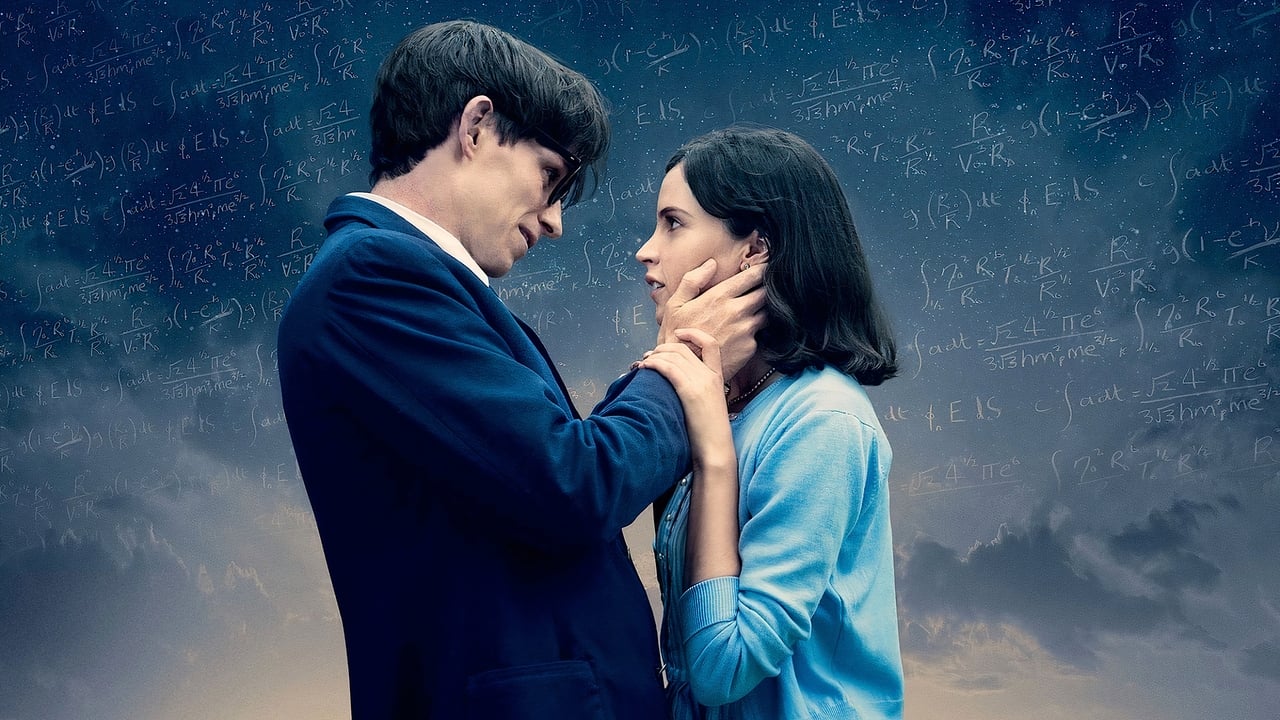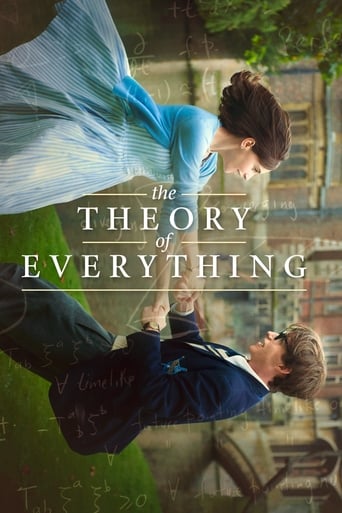

The great incredible story of professor Stephen Hawking was sincerely reflected on screen through the The Theory of Everything movie. I have to start with Eddie Redmayne's performance which genuinely exceeds any other performance I have ever seen in my life and in cinema, I really thought for a whole bunch of time I was watching the professor himself especially in his advanced stages of motor neurone disease , It's that kind of performance that still no award is made for it. Felicity did a great job too and had a beautiful chemistry with Eddie. The music of the film was very beautiful and a great companion to the performances and the screenplay was beautiful and careful too. The story only focused on his suffering with a small glimpse about his extraordinary theory and his genius mind which seemed to me as a story of a person that was suffering from a rare disease and was challenging to live and came up with a tremendous theory which could fill some parts where the story was away from him focusing on his wife and how in my opinion she was as he told her in the beginning that she was unaware and taken when she offered that they marry by what she did in the movie in the end of the movie and when he lived more than two years which was so awful and a very bad ending to such a great effort done with such a great person. In the end the movie is included in the 1001 must watch movies before you die so don't miss it. 8.5/10 with a great salute.
... View MoreThree movies so far have actually made me cry. Titanic by James Cameron, Hachi: A Dog's Tale by Lasse Hallström, and finally this one. Such a touching, moving and impressive piece of art. I do not care about objectivity, this movie is oscar movie is worth 11 out of 10I have never seen such a incredible fusion between documentary, biography, drama and romance movie, just remarakble. Not to mention extraordinarily acting done by Eddie Redmayne, his one face expression, without saying a single word, has told literally a thousand things. Telling such a incredible story with primary use of face expression is surely quite a challenge, and it's just perfect. The storytelling and the way characters are being elaborated is terrific and pretty accurate.Anyone who has basic knowledge and is interested (loves) in physics, particularly cosmology, and is familiar with dr. Hawkings work and his life (has read The brief history of time and The theory of everything) CAN NOT STAY lukewarm and listless.Objectively, this is a excellent oscar worth movie.Subjectively speaking, as a physics enthusiast, both this movie and Genius TV series are pure masterpieces."We are just an advanced breed of monkeys on a minor planet of a very average star. But we can understand the Universe. That makes us something very special."
... View MoreAs a glamorized story of perseverance saddled with romance, "The Theory of Everything" is a success. At the core this is a dramatization that makes for an emotional journey deliberating the weight of belief in several aspects. No one should judge this as if it ought to be a wealth of information to students of science. If you want facts, do research; don't fall back on drama. At times it was hard to watch; for me that made it more affective. Occasionally cliche, though I expected that. While I would recommend this to select people I am unlikely to revisit it myself. One only needs so much romantic drama, even if it has a few more elements to offer.
... View MoreAlthough it's not a true genre, Memoir/True Story is a methodology for writing a biography. Mixed with Drama, which shows the intimacy of characters in a web and a strong moral dilemma that "blows" in the Climax Sequence, the Memoir/True Story is like a detective story. Uncovering clues to a person's psyche is the detective aspect of this genre. And when one uncovers enough clues and is able to arrive at "the truth," what oftentimes happens is that "the truth" can be problematic. In the case of The Theory of Everything, the wife of Stephen Hawking made the conscious, if not romantic decision to "stand by her man." A religious woman by nature, this entered into her decision as well. After 25 years of devotion, with literally life-threatening decisions she had to make while a parent of three of their children, they end in divorce. The flip or transcendence of the usual beats of a deteriorating marriage are as follows: Stephen is not a disabled man in his heart or brain. His wife helped him to rise above that depression, which would have killed him had she not been by his side. His wife is not just a "caregiver" bleeding heart, but rather, a deeply spiritual woman who rose above what most young women look for in a marriage partner. This giving nature caused her to grow with an enormous character arc. She walked away from a long adulterous relationship when Stephen's life hung in the balance and she knew where her duties lay. Stephen knew where her heart really was though after many years of marriage. He was saddened by it, but he had an enormous respect for his wife's courage and strong moral values. The third transcendence occurred when Stephen finds himself falling in love with his new caregiver. He is a man falling in love - not a disabled, helpless victim. This is new to him and it empowers him. The caregiver replaces his wife in emotional importance. It's an evolution that is both poignant and painful at the same time. Both characters grow in wisdom and respect for one another. The concept of "time" is woven into this script as a type of symbol. Whether time goes forward or backward is not of the essence. Time is a chronological measure of growth and happiness. The real measure is ephemeral and everlasting. The two characters go through a moral epiphany that is called a Double Reversal at the end of the story. Stephen pushed away the possibility to survive in the beginning. In the end, he believes that his horizons are endless. Jane was committed to a moral and ethical way of behavior with a man at any cost in the beginning. In the end, she allows herself to follow her heart.
... View More